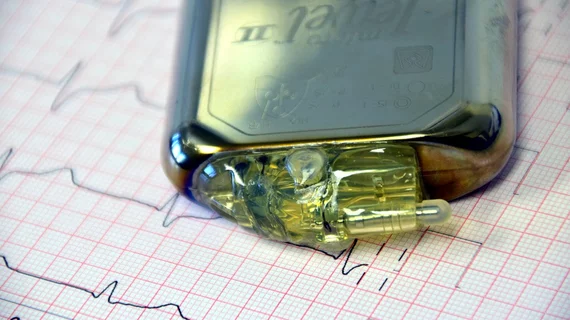Women implanted with cardiac implantable electronic devices (CIEDs) like pacemakers, implantable cardioverter defibrillators (ICDs) and cardiac resynchronization therapy (CRT) technologies are more likely to experience acute CIED complications than men who undergo the same procedures, according to work published Jan. 16 in the Journal of the American Heart Association.
Sex difference in CIED complications has been a topic of controversy for the past decade, lead author Katherine Moore, PhD, and colleagues said in JAHA. A handful of studies have suggested women fare disproportionately poorly during implantation procedures, but the question suffers from a paucity of clinical data.
“In recent times, there has been a growing interest in the role of sex differences as a key determinant of safety outcomes in healthcare,” Moore and co-authors wrote. “Thus far, limited population-level data exist on the influence of sex differences of overall CIED outcomes although several studies in the ICD populations have suggested a significantly higher prevalence of complications in patients who are women.”
The researchers included all adult patients who underwent a permanent pacemaker, ICD or CRT implant between 2010 and 2015 in Australia and New Zealand. Results were stratified by device type and gender.
Moore et al. identified 81,304 implantation procedures during the study’s five-year window—61,658 pacemakers, 12,097 ICDs and 7,574 CRT implants. Thirty-eight percent of patients were women, and overall the authors reported 8.5 percent of women and 8 percent of men experienced at least one CIED complication within 90 days of the procedure.
Sex differences persisted after adjustment for age, procedural acuity and comorbidities and were largely driven by excess rates of pleural drainage (1.2 percent of women vs. 0.6 percent of men) and pericardial drainage (0.3 percent of women vs. 0.1 percent of men), both indicators of complications like pneumothorax, pericardial effusion or tamponade. Women were also more likely to be rehospitalized for complications after discharge (4.7 percent compared to 4.5 percent of men).
“Our key result is that women experience a higher rate of CIED complications than men,” Moore and co-authors said. “Our data not only confirm a significant sex difference exists for overall CIED implantation, but that the difference is consistent across all CIED types, despite different indications and baseline characteristics.”
The authors said the exact mechanisms for women’s higher complication rates are unclear, but it’s possible they stem from anatomical differences. For example, women are twice as likely to require pleural drainage, which makes sense since they tend to have thinner vessel walls, smaller vessel diameters and less tissue between subclavian veins and pleura.
Moore et al. wrote their results highlight both the need for increased awareness of CIED complications in women and the need for further education and training among implanters themselves. Findings might also contribute to device improvements as those technologies move forward.
“Acute pneumothorax and tamponade are twice as likely in women,” the authors wrote. “Improvements in implant technique and technologies are required to minimize the risk of implant-related complications.”

